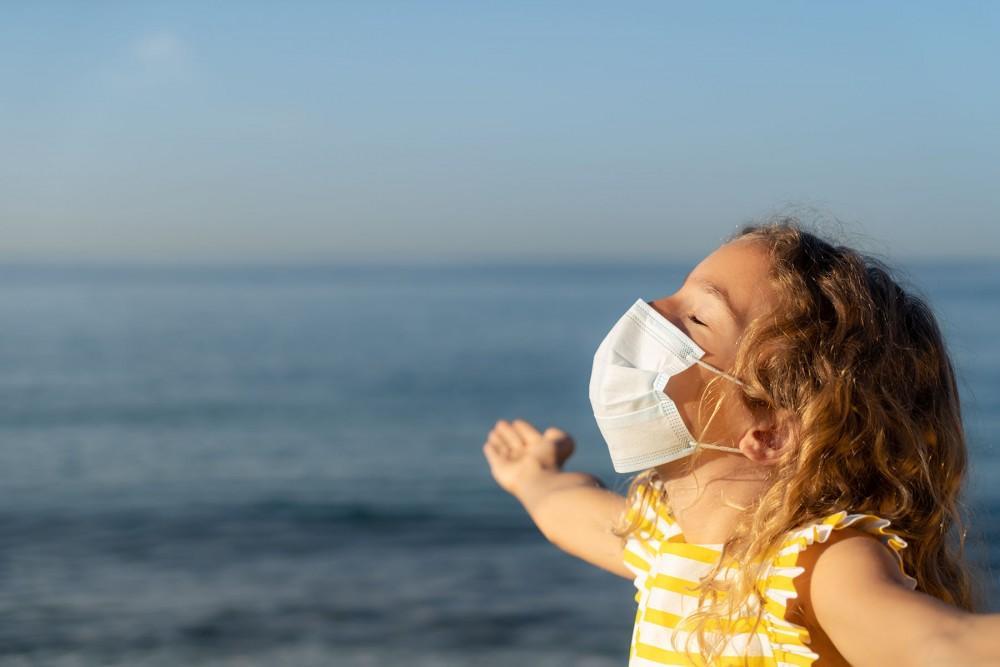During this reopening period, many of our patients are enjoying summer, yet still feeling anxious about navigating the specifics. These feelings can be further complicated by the fact that, although many adults are vaccinated, kids under 12 remain ineligible to receive the vaccine and, though case rates are dropping in many areas of the country, other parts of the world continue to struggle with the virus.
“It is possible to balance having a fun and relaxing summer and keeping everyone safe,” says Dr. Valerie Relacion, child, adolescent, and adult psychiatrist at the Washington Center for Women and Children’s Wellness. “If you or your kids are feeling anxiety, that’s normal. It will help to identify and even write down the questions you have and do a little extra research and planning, but the good news is so many summer activities take place outdoors and the risk of infection has been minimized greatly since last year.”
Read on for some tips to help you navigate your emotions while planning for fun activities, playdates, and vacations, as well as strategies you can use to help kids who are nervous about their safety or anxious about socializing.
Activities
If you’re anxious about allowing your children to engage in organized activities or summer camp this year (not to mention burned out from this past difficult school year), assuage your concerns by looking into the organization’s or camp’s masking, testing, and infection protocols, as well as staff vaccination requirements. The CDC has issued guidelines around summer camp practices, although each camp’s policies will be determined by the state, locality, and the camp itself. Camps that followed safety protocols last summer had an incredibly low transmission rate even as cases were rising in the country, according to studies from Maine and North Carolina.
Playdates
It has been heartening to see our kids with their friends again. However, it can be stressful planning playdates if you are concerned about the vaccination status of parents and teens in another household but are wary of an uncomfortable conversation.
“The pandemic pushed us to talk more openly about what we’re comfortable with and set boundaries in terms of health and our families, and that’s something we can hang on to,” says Dr. Relacion. She suggests asking about vaccination status in a straightforward and diplomatic manner, from a place of concern for your children as well as respect for the other parent, who is likely also thinking of their kids’ safety. “In the end, you’ll feel less anxiety if you know you’re doing what you can to protect your children,” says Dr. Relacion.
You can always share your family’s vaccination status first, which often encourages people to say whether they’re vaccinated, too.
Events
Similar to navigating playdates, if you’re hosting a backyard barbecue or picnic this summer, being clear about boundaries upfront can help you feel more at ease, such as setting masking and distancing expectations in your invitation. For example “We’re asking everyone who’s not vaccinated to wear masks indoors, and choose what you’re comfortable with outdoors.” Have extra masks on hand in case anyone forgets to bring one. Check out Johns Hopkins’ guide on what’s safe after the vaccine, if you’re trying to figure out ground rules.
If you’re invited to an event, check with the hosts to see what they’re expecting. It may help you feel safer to stick to outdoor events, like patio dining and outdoor concerts if you have unvaccinated kids at home.
Planning a trip
Taking a vacation is a great idea, for the memories and your mental health, and there are ways to do it safely. Again, planning ahead will ease anxieties and keep everyone safe. This can include checking about the masking practices of your accommodation and mode of travel; researching activities and dining options ahead of time; checking on vaccination and infection rates in your destination, and finding out if adults and teens of families you’re vacationing with are vaccinated. And remember— you don’t need to add the pressure of an overloaded schedule. After the past year, some R&R is definitely in order!
If your child is nervous about re-entry
What if your child is more fearful than you are? Some kids are understandably frustrated that their parents are vaccinated and they’re not. Address their concerns directly. Sit down with your kids and a calendar and discuss what they can expect over the next several months. You could sign them up for fewer activities than they might normally do and build up to more, as they get comfortable. You can also update them about the vaccine timeline. As of now, a vaccine for kids is expected later this year, possibly as early as fall.
If your child is more introverted and feeling anxious about socializing, it’s a good idea to talk to them about it. “Understand who your child is. If they love to read and want to be home all the time, maybe you could sign them up for an activity where they’re getting some exercise but they don’t have to be at camp all day,” says Dr. Alexis Wesley, child, adolescent and adult psychiatrist at the Washington Center for Women and Children’s Wellness. If they’re still experiencing significant anxiety around this, consider having them see a professional.
As we’ve said before, you don’t need to go from zero to 100 overnight. In fact, being patient with yourself and your family will lead to a more successful transition. Says Dr. Wesley: “After this past year, it’s important to take the pressure off yourself, and focus on making this summer one of quality time and creating memories.”








